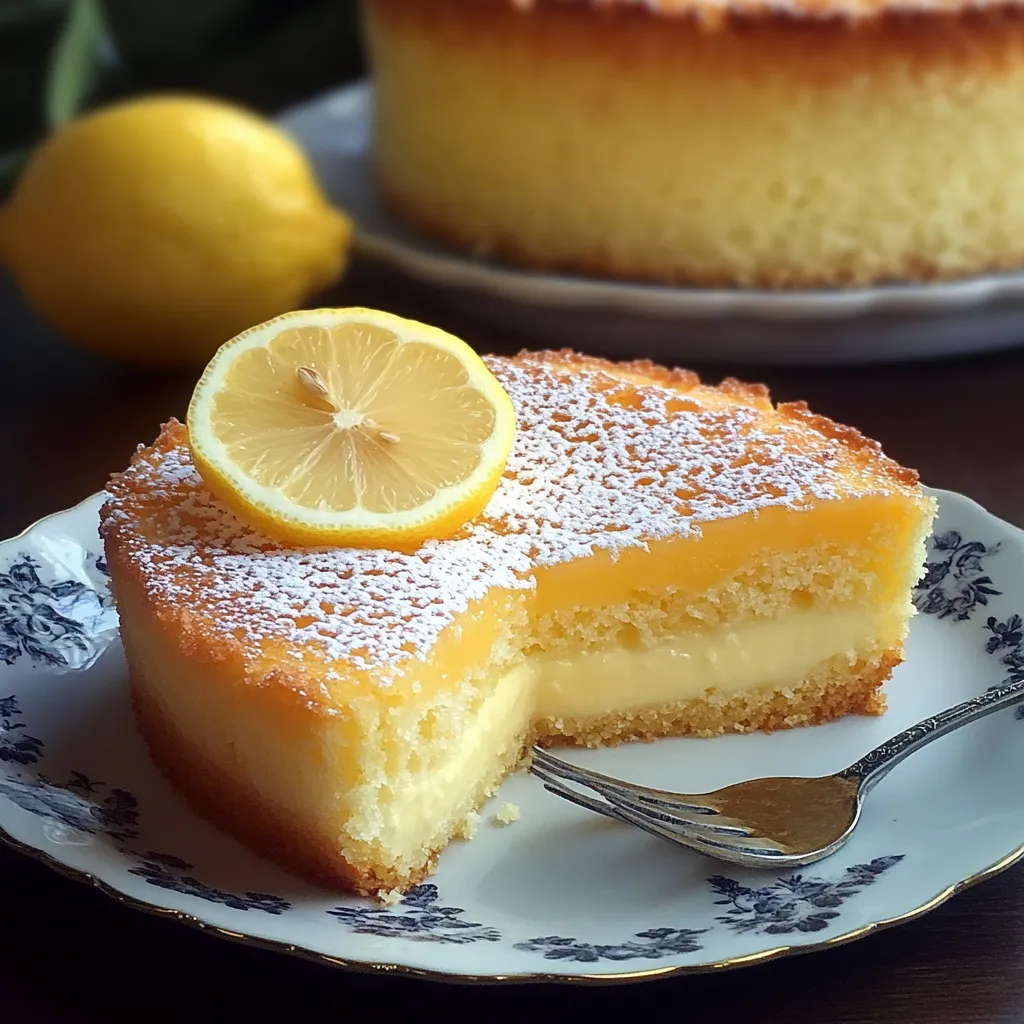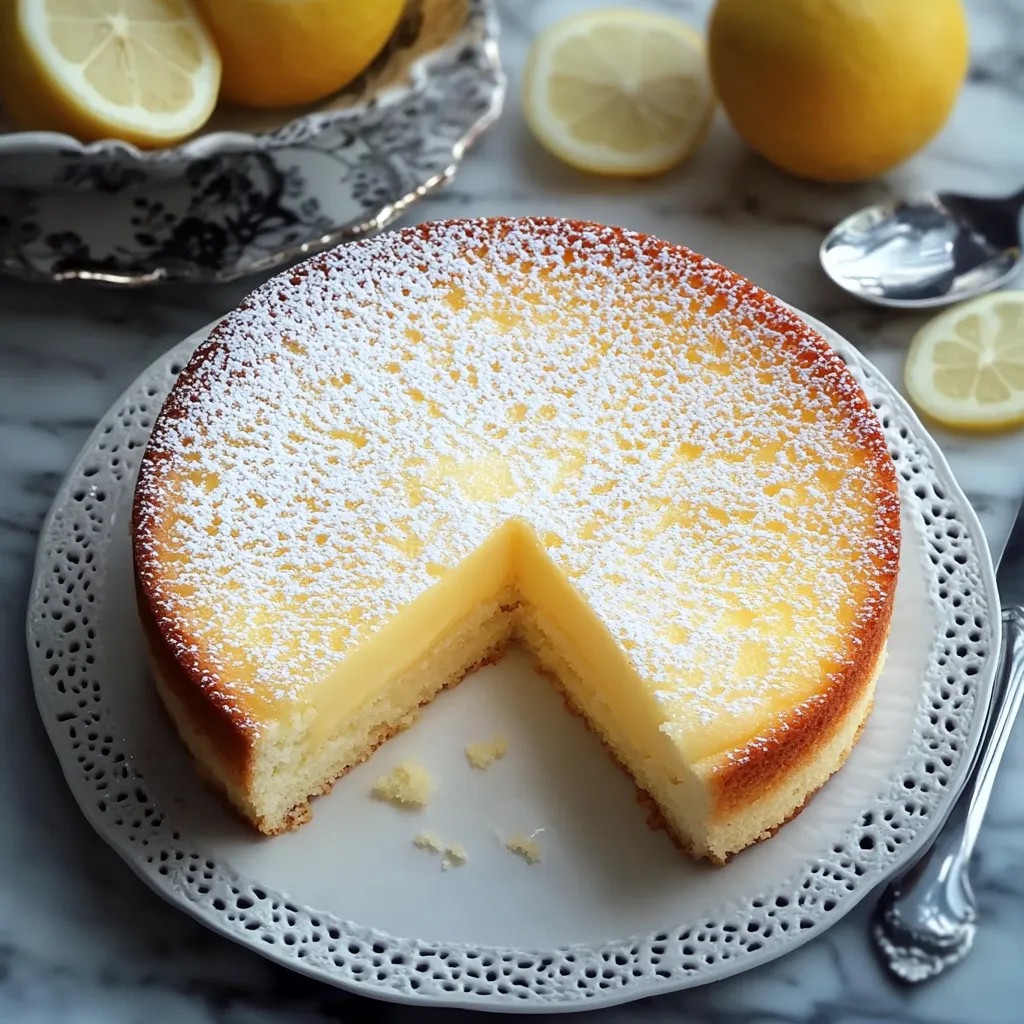 Pin
Pin
This exquisite lemon custard cake creates a magical two-layer dessert in one pan. The batter transforms during baking into a light sponge cake on top and a creamy custard on the bottom, all infused with bright lemon flavor that balances perfectly with the sweetness.
I discovered this recipe during a spring gathering and it immediately became my signature dessert. The way guests' eyes light up when they taste the contrasting textures never fails to make me smile.
Ingredients
- Unsalted butter: Adds richness and helps create the custard layer. Use high-quality butter for the best flavor.
- Granulated sugar: Provides sweetness that balances the tart lemon. The exact amount creates the perfect texture for both layers.
- Large eggs: Separated into whites and yolks. The whites create the fluffy cake layer while yolks enrich the custard.
- Fresh lemon zest and juice: Deliver bright citrus flavor. Always use fresh lemons for the most vibrant taste.
- Vanilla extract: Adds depth that complements the lemon. Use pure extract rather than imitation for best results.
- All-purpose flour: Provides just enough structure without making the cake heavy. Measure carefully for perfect texture.
- Whole milk: Creates richness in the custard layer. Room temperature milk incorporates better in the batter.
Step-by-Step Instructions
- Prepare Your Oven and Pan:
- Preheat your oven to 325°F and prepare an 8×8-inch baking dish by greasing it thoroughly and lining with parchment paper. Leave some paper hanging over the edges to help lift the cake out later. The moderate temperature is crucial for developing both layers properly.
- Whip the Egg Whites:
- In a clean bowl beat egg whites until stiff peaks form. This step incorporates air that creates the cake layer. Make sure your bowl and beaters are completely clean and free from any grease which can prevent proper whipping. The egg whites should stand up straight when the beater is lifted.
- Create the Batter Base:
- In a separate bowl beat egg yolks and sugar until pale and fluffy which takes about 3 minutes. The mixture should lighten in color significantly. Add melted butter lemon zest lemon juice and vanilla. Mix until combined then sift in flour and salt. Stir until smooth before gradually adding milk. The batter will be quite thin at this stage which is normal.
- Combine the Mixtures:
- Gently fold whipped egg whites into the batter in three portions. Use a wide spatula and cut through the center then scoop from the bottom up and over. Rotate the bowl as you fold. The batter will look somewhat lumpy with whites still visible throughout which ensures proper separation during baking.
- Bake to Perfection:
- Pour the batter into your prepared pan and bake for 40 to 50 minutes. The cake is done when the top is golden brown and it jiggles slightly in the center. Avoid opening the oven door during the first 35 minutes of baking as temperature fluctuations can affect layer formation.
- Cool and Serve:
- Allow the cake to cool completely in the pan before removing. The custard layer needs time to set properly. Once cooled dust generously with powdered sugar using a fine mesh sieve for an elegant finish. Slice with a clean sharp knife wiping between cuts for neat presentation.
 Pin
Pin
The first time I served this cake to my family the expressions of surprise when they discovered the custard layer underneath made me laugh. My grandmother declared it reminded her of lemon desserts from her childhood in the Mediterranean where citrus desserts are treasured for their refreshing qualities.
The Science Behind the Magic
The separation of layers in this cake happens naturally during baking due to density differences. The egg whites create air pockets that rise to the top forming the cake layer while heavier ingredients sink to form the custard. This fascinating process requires no special equipment or techniques just proper mixing and the right temperature.
When folding in the egg whites avoid overmixing which would destroy the air bubbles necessary for the cake layer. The lumpy appearance of the batter before baking is actually exactly what you want to see. This indicates that the egg whites will do their job in creating that distinct top layer.
The specific ratio of flour to liquid ingredients is crucial here. Too much flour would prevent proper separation while too little would make the cake layer too delicate to hold its structure.
Flavor Variations
The lemon base recipe offers endless possibilities for customization. Try substituting lime for a more tropical flavor profile that pairs wonderfully with coconut whipped cream. Orange zest and juice create a sweeter variation perfect for winter months especially when paired with a touch of cinnamon.
For a sophisticated twist add a tablespoon of poppy seeds to the batter. They provide visual appeal and a subtle texture contrast against the smooth custard. The tiny crunch complements the silky custard beautifully.
During berry season fold a half cup of fresh blueberries or raspberries into the batter just before baking. The fruit will mostly sink into the custard layer creating pockets of jammy sweetness that balance the bright lemon flavor.
Serving Suggestions
This versatile dessert shines when presented simply on its own but can be dressed up for special occasions. For an elegant dinner party serve slices with a small dollop of lightly sweetened whipped cream and a few fresh berries. The cream adds richness while berries bring color and complementary flavor.
For brunch gatherings pair with a spoonful of lemon curd on the side. The extra burst of citrus intensifies the flavor experience and creates a beautiful color contrast on the plate.
When serving in warmer months add a scoop of vanilla ice cream that slowly melts into the cake creating an irresistible sauce. The temperature contrast between the cool ice cream and room temperature cake enhances both textures.
Recipe Questions & Answers
- → What makes Lemon Custard Cake special?
The unique texture with a sponge-like top and creamy custard base creates a delightful contrast that sets it apart from traditional cakes.
- → Can I use bottled lemon juice instead of fresh?
Fresh lemon juice is recommended for the vibrant flavor it provides, which enhances the overall taste of the cake.
- → How do I ensure the custard layer sets properly?
It's important to bake at the correct temperature and let the cake cool completely in the pan, as the custard continues to set during this time.
- → What’s the best way to fold in egg whites?
Fold egg whites gently into the batter in small batches to maintain the airiness needed for the sponge layer.
- → Can I add other flavors or ingredients?
Absolutely! Try adding berries, shredded coconut, or a small amount of lavender or rosemary for a creative twist.
- → How should I store Lemon Custard Cake?
Keep it in an airtight container in the refrigerator for up to 3 days. Let it sit at room temperature before serving for the best texture.